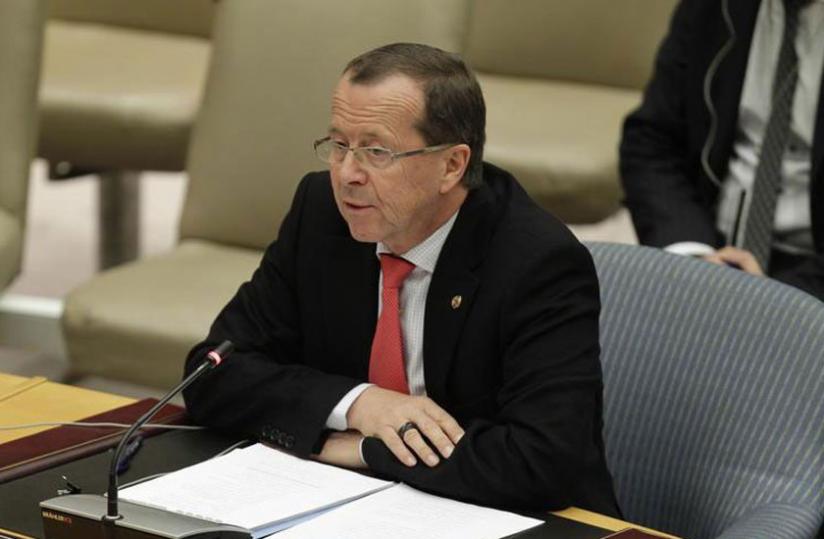SEVERAL experts have reacted with skepticism to the recent move by the UN to drop pre-conditions made before it could cooperate with the Congolese army to tackle FDLR militia.


SEVERAL experts have reacted with skepticism to the recent move by the UN to drop pre-conditions made before it could cooperate with the Congolese army to tackle FDLR militia.
The United Nations Organisation Stabilization Mission in DR Congo (MONUSCO), last week, dropped its previous demand that two DR Congo army generals involved with the operations against the genocidal outfit be replaced before the peacekeepers can cooperate with the Congolese army on the military offensive against the FDLR.
However, scholars and experts warn that recent history had shown that MONUSCO is hesitant to carry out the operations.
FDLR is a terrorist outfit largely composed of elements responsible for the 1994 Genocide against the Tutsi in Rwanda. The group was formed by the fleeing Interahamwe militia and the ex-FAR between 1994 and 1997 and have continued to foment the genocide ideology within the region.
MUNUSCO and the DR Congo army were expected to launch a joint military offensive against the FDLR following failure by the militia group to observe the January 2, 2015, deadline of voluntary disarmament.
The UN Mission, in February, suspended cooperation with Congolese troops, calling for replacement of two Congolese generals who were deployed as commanders in the region of operation.
The two generals, Fall Sikabwe, commander in North Kivu Province; and Bruno Mandevu, commander of operations against the FDLR, were accused by the United Nations of human rights violations and war crimes, with the UN claiming that the assignment of the two generals would taint the image of the operation.
The ultimatum was rejected by the DR Congo government, which said the generals can only be dropped after being convicted in military tribunals.
‘Buying time for more excuses’
Martin Kobler, the head of MONUSCO, last week told the United Nations Security Council that they had dropped the pre-conditions and talks on co-operation with the Congolese government had resumed.
Experts have, however, warned that MONUSCO had found reasons not to act against the militia on several occasions and there was no reason to believe them this time around.
Dr John Musemakweri, the director of Institute of Research and Dialogue for Peace (IRDP), told The New Times that the recent statement may not necessarily have been motivated by an attitude adjustment but to shift goal posts.
He added that it was highly likely that in the coming days, the UN might come up with another excuse to avoid pursuing the militia group or another tactic to postpone the forced disarmament or offensive against the militia.
"The lack of truthfulness in the problem solving process is one of the reasons it has been increasingly hard to bring to an end to the FDLR question. There are so many external parties concerned, including members of the international community, countries within the region, ICGLR but very low representation of the local community in the Congo,” Dr Musemakweri said.
The ICGLR is the International Conference for the Great Lakes Region, a regional bloc that had issued the January 2 deadline for the FDLR to disarm.
Dr Musemakweri further questioned the consultations and considerations made before dropping the considerations. He said it was rather interesting that MONUSCO was ready to work with people they had previously said endangered the operations.
It seems that a lot of time is being taken, money spent for the benefit of other parties other than the victims of the militia group, he noted.
Dr Musemakweri said it is until the problem-solving mechanisms by the international community are developed with local communities in mind that there was likely to be an end to the FDLR militia.
Equipped but toothless?
Experts say MONUSCO has adequate military power as was demonstrated in swift elimination of M23 rebels, but with the FDLR, what lacks is political will of the United Nations and "probably some troop-contributing countries for the Force Intervention Brigade.”
The brigade, which is under MONUSCO, is composed of troops from Malawi, South Africa and Tanzania.
Dr Charles Kabwete Mulinda, the head of the Department of Political Science at the University of Rwanda’s College of Arts and Social Sciences, said it is until MONUSCO goes beyond the usual rhetoric and act accordingly that the people of the region can regain confidence in them.
"So far they have not showed any commitment to fight FDLR,” Kabwete said.
MONUSCO has an estimated 20,000 troops. In March, the Security Council refused to cut the number of peacekeepers in the Congo, citing need for progress in the fight against the FDLR.
Tom Ndahiro, a renowned genocide scholar who had in February told this newpaper that the pre-condition to replace the generals was a scapegoat not to act, said that nothing was likely to happen in coming months as there was simply no will to carry out the operations.


